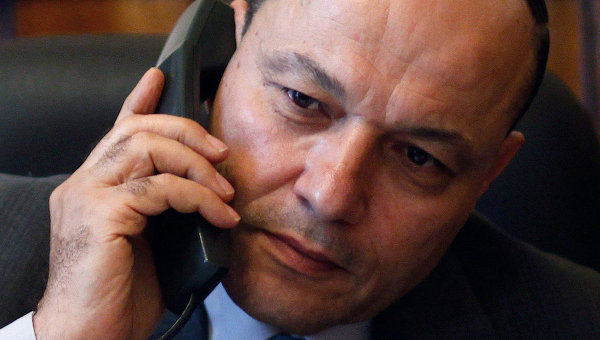CAIRO: In its annual meeting in Cairo last week, the United Nations Relief and Works Agency for Palestine Refugees in the Near East (UNRWA) addressed its dire financial situation, saying it still needs funds to cover the next six months.
“I’m ringing the alarm bell,” Filippo Grandi, commissioner general of UNRWA said, “We have six months to go and are still in need of $103 million in order to master the year without closing down our activities.”
Bringing together both donor and hosting countries, the conference was held under Egyptian chairmanship on June 21 and 22.
“This year we lost around $20 million just because of exchange rates,” Grandi said, pointing at the UNRWA budget’s dependence on the global market.
“UNRWA has to face an increasing number of refugees in a time where donating countries face economic problems and lower their financing,” UNRWA’s Saudi Arabian Vice Chairperson Hassan Al Attas, said, announcing at the same time Saudi Arabia’s commitment to continuing and increasing its donations.
On July 1, Saudi Arabia will take over the chairmanship of the committee.
UNRWA’s budget depends on voluntary donations, of which the US and the European Union are the largest contributors. Arab countries seem to be very generous when it comes to special projects and emergency situations — the Emir of Kuwait personally donated $34 million after the Gaza crisis 2009 — but their contribution to the core-budget of UNRWA is relatively low.
In 2009, UNRWA spent $1.2 billion for its core programs, emergency activities and special projects, of which only 86 percent were covered by funding.
“People sometimes wonder why the UNRWA has a staff of 30,000 people. But 20,000 of them are teachers, some other few thousand are doctors — the administrative staff represents maybe 2–3 percent,” Al Attas said. “A lack in our budget means fewer teachers, fewer doctors, more children on the street and more adults without jobs.”
In 2009, 52 percent of UNRWA’s budget was spent on education, 19 percent on health services and 10 percent on relief and social services.
“The nursing child that has left his Palestinian home in 1948 is now a grandfather,” Amr Aboulatta, head of UNRWA’s Advisory Commission, said, speaking on behalf of the Egyptian Foreign Minister.
Refugees around the region
Of the 7 million Palestinians, 4.7 million are registered as refugees at UNRWA. These refugees are split between Jordan, the Gaza Strip, the West Bank, Syria and Lebanon.
Moreover, updates on regional developments and challenges showed similar concerns. In all five places, money is lacking, services are cut and their quality is deteriorating.
“Our health services are facing a dramatic lack of personnel: At the moment, there are 120 patients per doctor per day, there are no more savings that can be made,” Salvatore Lombardi, field director of UNRWA Lebanon, said.
“Anger, frustration and a sense of hopelessness make the refugees turn to other sources of funding even if these sources often demand a political allegiance in return,” Roger Hearn, field director of UNRWA Syria said, adding, “The financial crisis paralyzes our work and compromises our credibility in front of the refugees.”
Jordan, hosting 41.6 percent of the Palestinian refugees, sees its minimum support of $120 per person per year threatened. “Even this modest aim will be difficult to achieve,” Richard Cook, field director of UNRWA Jordan said.
“Ninety-three percent of the schools are double-shifted, with 50–55 children per class. It is not a fruitful environment for learning,” he added.
“We are crippled by the lack of essential funding. You know how desperate we are,” said West Bank UNRWA Field Director Barbara Shenstone, pledging the donating countries to increase their support. “Your funds are the key to everything.”
Gaza, where the situation is deteriorating every day, is home to more than 1 million refugees — out of a population of 1.5 million. “Eighty percent of the population is dependent on food provided by the UN, 95 percent of the private sector businesses have closed down. We need a decision from the policy makers that is neither safe, nor popular, nor political, but morally right,” John Ging, field director of UNRWA Gaza said, warning that “if there is no change, there will be less food, less cash, less job opportunities. Palestine, Israel and the international community will pay a heavy price for this.”
The Israeli-Palestinian conflict
Next to the financial shortfall, the ever-urgent situation in Gaza was prominent at the conference.
“Those who believe that a solution for the refugees can be found without a permanent settlement of the Israeli-Palestinian conflict believe in an illusion. It is a regional problem,” Aboulatta said, supported by all participants who heavily criticized Israel — absent from the conference — in their opening speeches and pointed to Israel’s responsibility in the ongoing refugee situation.
“May 31 showed the pathological nature of the Israeli occupation,” Grandi said, referring to the Israeli attack on the Gaza-bound flotilla. “But like in many tragedies, there is an opportunity: The government of Israel has declared some relieving measures, but it is unclear where they will lead,” he added.
“The blockade prevents us from providing good education and health services. We want the lifting of the blockade. What we need is the free two-way flow of persons, goods and currency to reconstruct Gaza,” he continued. “There is money for the reconstruction. In March 2009, after the war in Gaza, countries pledged $4.5 billion of aid at the Sharm El-Sheikh conference, but the budget is frozen, as the reconstruction is not possible in these conditions. If we are allowed to, UNRWA is ready to start tomorrow.”
“Palestinian people have been held hostage by politics for too long,” Grandi concluded, “Political courage, desperately needed to solve the current situation, is missing on all sides.”

